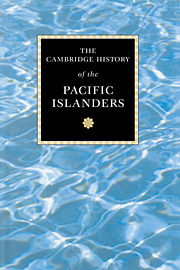Book contents
- Frontmatter
- Part One The Pacific To 1941
- 1 Contending Approaches
- 2 Human Settlement
- 3 Pacific Edens? Myths and Realities of Primitive Affluence
- 4 Discovering Outsiders
- 5 Land, Labour and Independent Development
- 6 New Political Orders
- 7 New Economic Orders: Land, Labour and Dependency
- 8 Colonial Administration and the Invention of the Native
- Part Two The Pacific Since 1941
- Abbreviations
- Glossary
- Bibliography
- Index
- Map
- Map 17: Maximum expansion of Japanese control
- References
6 - New Political Orders
from Part One - The Pacific To 1941
Published online by Cambridge University Press: 28 March 2008
- Frontmatter
- Part One The Pacific To 1941
- 1 Contending Approaches
- 2 Human Settlement
- 3 Pacific Edens? Myths and Realities of Primitive Affluence
- 4 Discovering Outsiders
- 5 Land, Labour and Independent Development
- 6 New Political Orders
- 7 New Economic Orders: Land, Labour and Dependency
- 8 Colonial Administration and the Invention of the Native
- Part Two The Pacific Since 1941
- Abbreviations
- Glossary
- Bibliography
- Index
- Map
- Map 17: Maximum expansion of Japanese control
- References
Summary
NEW POSSIBILITIES
For much of the nineteenth century, especially in the central and eastern Pacific, political openings matched the material opportunities discussed in chapter 5. The institutions and traditions of chiefly societies were often modified in the light of new perceptions of power and sometimes at the instigation of foreigners. Some ambitious chiefs created centralised polities: but these structures often yielded more advantage to foreign adventurers than to the common people of the Islands.
Political destinies were shaped mainly by patterns of European trade and migration interacting with indigenous political structures. Two models of foreign settlement crystallised in the nineteenth century, with very different long-term implications. In Australia and New Zealand, indigenous people were outnumbered by European settlers who gained power through settler states and controlled the political agenda. Aboriginal Australians were decimated by introduced diseases, massacred, expelled from arable lands and pastures, and marginalised by force of numbers. Intermarriage, rape, cohabitation and compulsory adoption threatened cultural continuity. New Zealand Maori were also out-numbered, but were better able to engage in European-style economic and political contest. Because indigenous people become in effect an internal colony of the immigrant society, they were subjected to regimes which have been called ’domestic colonialism’.
Keywords
- Type
- Chapter
- Information
- The Cambridge History of the Pacific Islanders , pp. 185 - 217Publisher: Cambridge University PressPrint publication year: 1997
References
- 4
- Cited by

